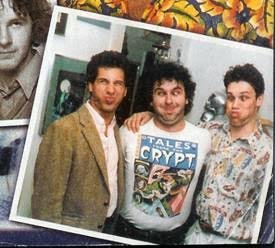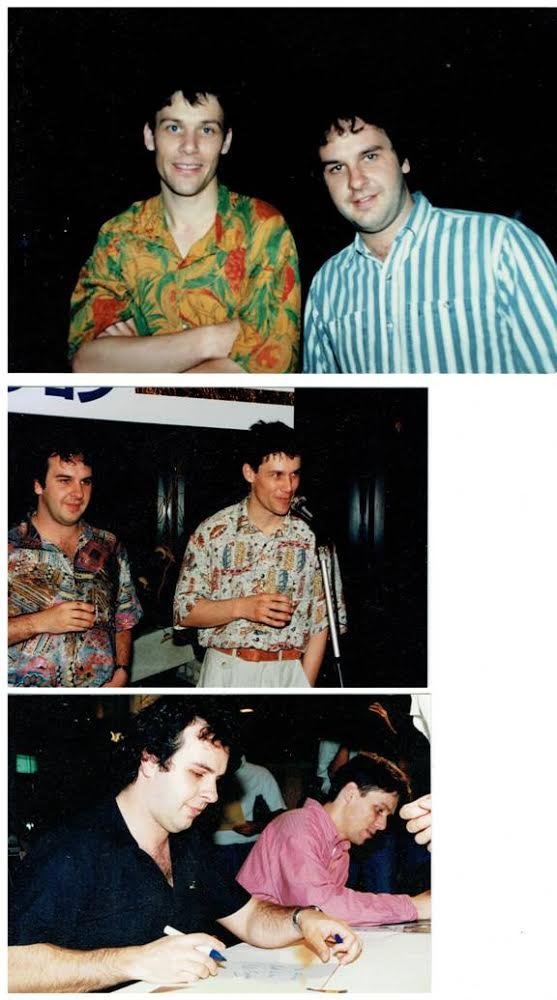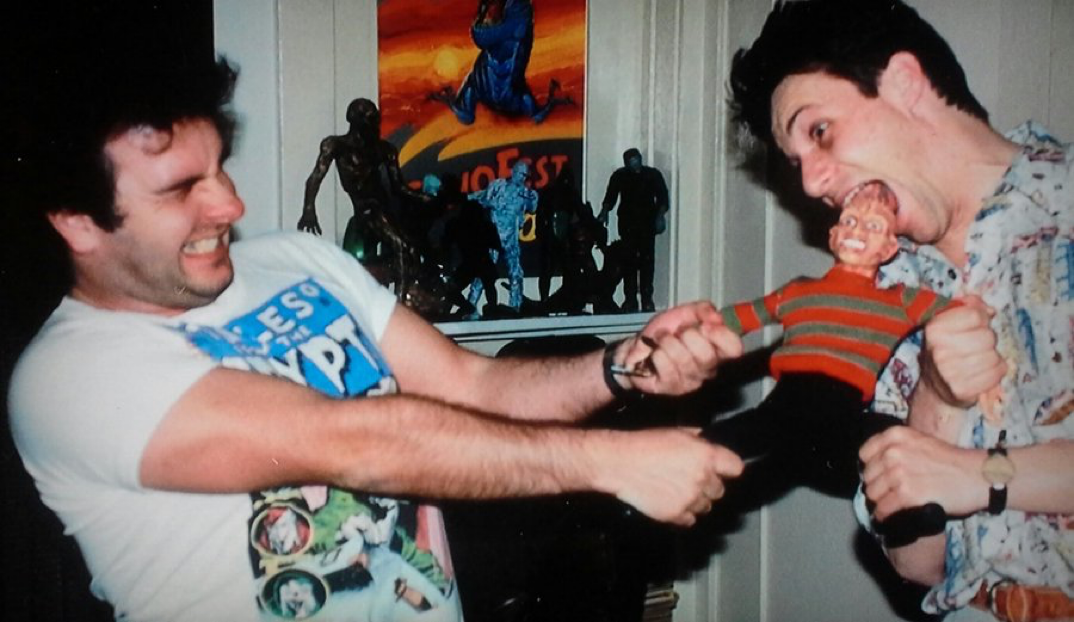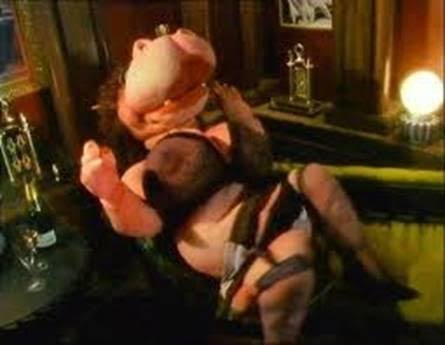FEEBLES, FREDDY AND THE FURRY ARM OF THE LAW
It may not have set the box office alight, but the cult New Zealand sex-and-violence-laden puppet film 'Meet The Feebles' put filmmakers Peter Jackson and Danny Mulheron on the map. Before long, New Line Cinema enlisted the duo to take on one of their most beloved and feared franchises. Mulheron reflects on his brief time in Los Angeles, his work with Peter Jackson and an unsuccessful pitch into the world of television with the most unlikely of writing partners – a veteran writer from Jim Henson's popular educational program, 'Sesame Street'.
Wide-eyed in Babylon is how Danny Mulheron describes his time in Los Angeles. His writing partner at the time, Peter Jackson, had already started to make a name for himself with his debut - the appropriately-named 'Bad Taste'.
But it was Jackson's second film as director (and Mulheron's first feature as writer), 'Meet the Feebles' that put them both on the map as talents to watch and catapulted the duo into their first gig as a set of hired guns for a major American studio.
So when Hollywood beckoned, they were already at work on another feature with the support of the New Zealand Film Commission, an epic satiric fantasy called 'Blubberhead'. Inspired by the early films of Terry Gilliam that – in later years – would be described as the missing link between Jackson's schlock horror comedies and his more prestigious, epic 'Lord of the Rings' series.
BLUBBERHEAD
"It was all in one period, a burst of creativity," Mulheron said.
"'Blubberhead' came out of that because Peter was into those 'Lord of the Rings' type worlds… he had quite an anarchic sense of humour back then, too; he was into big, visual slapstick set pieces… Buster Keaton-type stuff. I was more into satire. We'd got some funding from the Film Commission for it - it was a fucking crazy story, Terry Gilliam crossed with Terry Pratchett... there were a lot of mad set pieces, and I have no idea how Peter was actually going to do it. It was set in this medieval town… the people are living in a city that's turned upside down. Imagine a lake near a mountain… and you see the reflection of the mountain in the lake. The city's like that reflection. Blubberhead is this gigantic monster that sits above the city, shitting out bureaucrats who collect taxes for him. He's like a baby Jabba the Hutt, screaming, yelling, always wanting more food and shitting out these pod people who take money from the poor. It was written with this particular actor in mind, Michael Hurst, who would've played this handsome, dwarfy pest exterminator. And when I say 'pest exterminator', the pests in this place are giant fucking dinosaurs and spiders; they're not little pests. And he goes on this quest, and in the end, it's a literal revolution. The exterminator helps revolve the city back to its proper status. It was very satiric and Kafkaesque… it was fun. It was the sort of movie that needed big ideas, and Peter loved those huge set pieces and felt he could do them… his point of view was, 'who'd want to see small spiders?' And at the time, the [New Zealand] Film Commission were more open to that sort of thing back then; they were more interested in backing and encouraging filmmakers they thought would make it."
But the lure of Hollywood proved too strong, and Jackson and Mulheron took the plunge after catching the eye of an astute reader from New Line Cinema, who thought they'd be an ideal fit for one of the studio's most enduring franchises.
A NIGHTMARE ON ELM STREET: THE DREAM LOVERS
"We really thought we'd made it," Mulheron said.
"To be honest, I was a sucker. I thought, 'This is my golden goose, we've nailed this, and we're the only people on earth'. 'Feebles' was ludicrously low budget - we'd lied to the (New Zealand) Film Commission about getting the money, it was closed down at one point. It failed dismally from a financial perspective, but it became this cult movie, and it was noticed by this guy called Mark Ordesky, who was a reader with New Line at the time. He saw 'Feebles' and was like ', Fuck, this is mad; we've got to try and get them writing stuff for us.' So he tossed us some coin to see what we could do… so we got something like 50 grand to write a 'Nightmare on Elm Street' sequel."
For the 'Elm Street' franchise, Mulheron and Jackson had an audacious take that would've gone deep into the Freddy Krueger mythos, exploring the man behind the razor-fingered glove.
"Peter and I looked at all the movies and took out all the supernatural elements, the illusory stuff, and Sid' Well, what do we actually know about him (Krueger)? What are the crimes he committed?' We knew he was interested in cutting; he had an almost sexual interest in cutting and stabbing. We were looking at facts, not the mythos. We knew what he wore, his sense of humour. We took all this material to a forensic psychologist - a profiler - to look at these things and tell us what he thought he'd done. We didn't want to be mystical about it; we wanted to look at who Freddy was. He dressed like a ten-year-old; he used knives as a penetrating weapon all the time because he was most likely sexually dysfunctional; he was probably sexually abused by an uncle. So we wrote up this profile for this kid who was sexually abused, violently disfigured and this kind of geeky, sensitive kid. Because nobody that cruel can be insensitive. Freddy would have been sensitive at one time, he would have been hurt badly, and that's when the desire for revenge would come - starting with torturing animals and building from there. And we made this file - like a psychiatric report - that was going to be hidden in a safe deep inside Freddy's world. We wanted Freddy to be human, and that was an idea that I really loved - because the really scary thing is these people exist, and often we create them."
For their take on Freddy, Mulheron and Jackson drew inspiration from another iconic screen presence.
"One of my favourite actors is Robert Mitchum. He had a way of moving that was both beautiful and threatening," he said.
"And something like 'Night of the Hunter' is extraordinary because it captures a child's idea of a nightmare… big rooms, dark shadows and overwhelming fear. Mitchum was brilliant in it - terrifying, but he showed that mad preacher's weakness at the end, playing him as a snivelling little coward, which was just brilliant."
With the 'Elm St' sequels leaning heavily into the wisecracks, Mulheron and Jackson felt it was time for the franchise to course correct.
"We wanted to reboot it and do that in a way that made him powerful again," he said.
"The premise was that Freddy's a nothing; he's a hobo. "He's this pathetic loser, and kids are taking these meds to knock themselves out, go into Freddy's world and beat the living shit out of him. They're these nice, middle-class kids, going in there so they can talk about how they kicked his ass - and they were brutal, like the scene with the old hobo in 'A Clockwork Orange', that kind of stuff - and they were basically us, the audience. The idea is that one of these things goes horribly wrong; Freddy's had enough; he fights back and kills one of these kids. And all of a sudden, because of the medication they've taken, they're trapped in his world. There's another guy who's also trapped in this world, a cop who's in a coma - and his daughter is one of the kids who's been going in to beat up Freddy and is now trapped. So he's trying to hunt down Freddy, and the only way he can de-power Freddy is to find this file and confront Freddy with the truth about himself. In the big face-off, he confronts Freddy with these facts. This is who did this to you; you haven't confronted this; you're impotent. And every time he does, he removes some of that supernatural fear. Then our twist on the big finale was that it was just these two guys fighting each other, Mano-a-Mano - no supernatural shit. He manages to de-power Freddy for long enough to get the kids out, but he never regains consciousness and dies on the table. It's only a temporary victory, though, and Freddy doesn't die in the end, which is always the way in horror movies. We wanted to reboot it in a way that really did reboot it."
Mulheron said they were utterly unaware that New Line were looking at other options for what would be the eventual sixth 'Elm Street' movie.
"We got a lot of praise from New Line, we kept getting yesses from the readers, and it kept going up, right until the point where they said 'no', this other person's going to do the next one."
So the movie in question ended up being 'Freddy's Dead: The Final Nightmare', directed by Rachel Talalay and written by Michael DeLuca, based on a story by Talalay.
"It was a dead end. Mark (Ordesky) really did try; I don't think it was cynical on his part - he really did try to make it work. And Mark was fostering that relationship with Peter and New Line, so when 'Lord of the Rings' came along, there was that history with them. I honestly thought it was a really fun, good idea. At the time, Peter was still experimenting with that very fluid camerawork, and I can see him making that film really well."
Even though it didn't eventuate, Mulheron said he enjoyed his time in the world of 'Elm Street'.
"I like horror movies… they often have great, profound ideas hidden in them," he said.
"And in these films, there's that horrible feeling of being in a dream that you can't wake up from. And Freddy's quite literary in a way. Different writers have made different things out of him. But he's kind of a horror Oscar Wilde - not as pithy as that, mind you. But I had a lot of fun writing that kind of stuff - you know, things like 'If you want to play games, let me teach you the rules'. Wes Craven was a really clever filmmaker and a great storyteller. And it was great to be part of that outrageous, weird kind of primal world for a while."
ONLY PUPPETS BLEED
After 'Dream Lovers' fell apart, Mulheron and Jackson parted ways."Peter was clearly on another path by then, 'Blubberhead' was forgotten and didn't go anywhere," Mulheron said.
"He was on to other movies by then, and when 'Only Puppets Bleed' came along, he didn't want anything to do with it."
Instead, Mulheron hooked up with another writer whose own background with puppetry was about as unlike 'Feebles' as anyone could get. Playwright and screenwriter Mark Saltzman's feature debut was the film 'The Adventures of Milo & Otis', which led to writing gigs with Jim Henson on 'Sesame Street'.
"I don't have the muppet sensibility in my DNA; it was a job. A job that I loved, but when I write on my own, I'm more of an ironist, and my work is rarely buoyancy, sweetness and happy endings," Saltzman said.
"With Jim (Henson) and Frank (Oz), it would always be a fairytale land, there may be setbacks, but nothing truly bad ever happened. The sensibility of those guys was very sweet-natured, whereas with Danny and Peter, well, you couldn't say the same about them. God bless them. Danny and Peter were taking a chainsaw to the Muppets. In 'Meet the Feebles', the puppets had fluids in them! No one else would even conceive of that - our puppets were dry!"
The unlikely collaborators were connected through a production company owned by John Ritter, which was keen to see what the duo could do.
"They were the matchmakers here - they'd been talking to Danny, and then I kinda walked in, and they said, 'Let's see what you can come up with," Saltzman said.
They settled on taking the genre dominating network TV and giving it a satiric bent.
"Cop shows were incredibly popular at the time, so it wasn't that much of a leap to get to the muppets doing a cop show," Saltzman said.
"We wanted it to be a bit like 'the Simpsons', although not as openly satiric," Mulheron said.
"It wasn't going to be 'staged' - it was going to be shot in the style of a documentary. Our main character was going to be a bear who was your classic depressed cop. The opening scene would've been in an ER - the ER doors opening and his partner, a duck, getting wheeled through on a gurney, getting CPR. The partner dies, and that's our starting point."
Saltzman and Mulheron were adamant on one point: while it may be a comedy, it needed to be played completely straight - or at least as straight as you could play a puppet-led police show featuring crack-addicted puppets.
"On the script level, it needed to play like a police drama," Saltzman said.
"We needed suspects, red herrings, ambushes, chases - all the staples. Otherwise, it wouldn't be a show; it'd be a sketch spoofing a cop show. We were aiming for a script where - if you gave it to human actors; it would still play as a valid piece of television."
"We wanted to take it absolutely seriously," Mulheron said.
"If you remember things like 'The Flintstones', there were moments where you'd have a bird playing a record with his beak, and turning to the camera and saying something like 'It's a living', or 'I hate my job'. I really didn't want those kinds of dumb jokes; I wanted us to have characters that would have actual humanity. Yes, there were fucking ducks and bears, but we could make it really dramatic and satiric - have episodes about drugs or abortion; these really dramatic issues. Someone like Eight-Ball in 'Meet the Feebles' works partly because he fought in Vietnam - you see a frog taking drugs and it's like, 'Fuck, so what?', but when you give them actual character, people become interested in the story."
Despite the positive feedback from the production company, 'Puppets' failed to land. Mulheron believes it was partly because of the edgy nature of the material but also due to bad timing.
"There was this other terrible show with puppets that came out around the same time… and it really fucked it for us," he said.
"The show was 'Dinosaurs', and it had these big, lumpen dinosaurs, and it was full of those jokes that I hated - that Fred Flintstone stuff. It was a hugely expensive failure. And, for us, we weren't able to just go out and shoot a pilot - we'd need to create all the puppets. You can't just get a few actors on a set and shoot it. It's an expensive exercise."
"If I had my chance to do it again, I'd fix one thing - I'd shoot some film or video of our own, get Danny to make some very rudimentary puppets - so they could see what we were trying to do," Saltzman said.
"That was probably our biggest error; counting on television executives to imagine things. And it can be a hard thing to do. When you're reading a novel, it's all right there. But when you're reading a screenplay or a play, it's not the finished product. It's a blueprint. Reading a screenplay, you can get caught up in the dialogue to the point where you need to flip back a few pages to remember where the characters are. You think studio readers are the most sophisticated readers - but they read so much that it's almost burned out that inner eye. They have deadlines, meetings in 10 minutes; they have to whiz through these things. If we engaged them visually and had 10 minutes to show them where we could say 'and here's this puppet being wheeled in on a gurney, with this bear and porcupine in police caps', I think we'd have had a better shot. So if I could change one thing, it wouldn't be the script - because I remember being proud of it, it would be the sales techniques. Something like this was so oddball, so eccentric that we really needed to take them by the hand more."
For Saltzman, the rejection was just another day in the business.
"That's how the sausage gets made, and sometimes it doesn't even get to the grill," he said.
"There's a lot of projects where you're writing through clenched teeth with white knuckles muttering 'Just give me the paycheque' - this was definitely not one of those. It really was a fun ride. I was disappointed, but it felt like Danny was crushed. This was still his first real experience here, and I had that feeling he was more optimistic. He was younger and coming to Hollywood; there can be this 'Here's your project, get ready for the red carpet and the awards' feeling. When you come here for the first time, it really can be overwhelming; you can't help but be starstruck; it's just a natural phase that you go through.”
"I really thought it had legs, and it was really disappointing for me," Mulheron said.
"I really was wide-eyed in Babylon. I was thinking everyone was better than me. These guys were all in suits, they had money, and I was looking at them thinking they must know shit – which wasn't true at all. They didn't know any more than I did, but I lost my confidence there at that point. I was looking around thinking, 'gosh, this is marvellous. I'm just a peasant here'. I felt out of my depth. Now I realise that wasn't the case – I was actually trying to dive in the shallows. There really isn't any deep end. There's just people nervous for their jobs and willing to grab on to anything they can to stay afloat. So I left feeling deflated and defeated. It cost a lot in terms of relationships, my daughter was only one year old at the time, and I was away for a year. I'm not saying I shouldn't have done it – I really wanted to do it. But in the end, I didn't really achieve anything."
Some years down the track, 'Puppets' caught the eye of Roger Law, the satirist behind the UK series 'Spitting Image', but a dispute over the cost of the rights meant the project was never revived.
Mulheron subsequently fell out with Jackson and later became a vocal opponent of New Zealand's so-called 'Hobbit law' – a highly contentious piece of industrial relations law designed to ensure the three 'Hobbit' movies would be filmed in New Zealand.
And despite the failure of his United States excursion, Mulheron's carved out a substantial career in his homeland of New Zealand, where he's written and directed for stage, big-screen and small screen (including the critically acclaimed television comedy 'Seven Periods With Mr Gormsby'.
"The time in the US was very traumatic. You get full of regrets, full of recriminations. And that's always pointless. But I'm glad people are still interested in these things because they really are some good stories."





Anotherfilmnerd's earliest cinematic memory was seeing Don Johnson throw up all over a suspect in John Frankenheimer's 'Dead Bang'. Ever since, he's devoted his life to searching out cinema that's weird, wonderful and features vomit in the most unlikely of places.